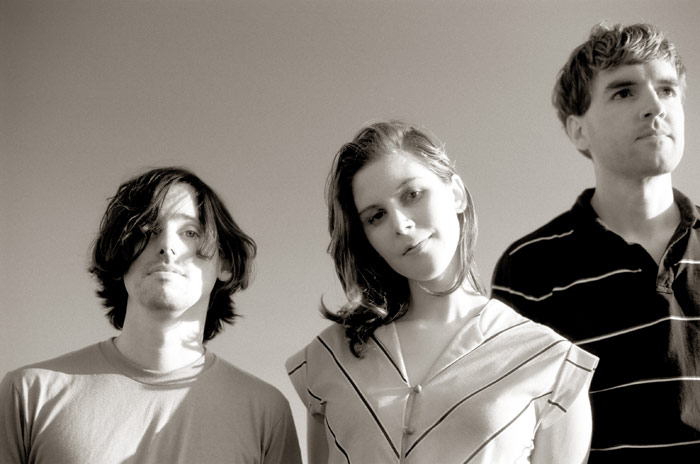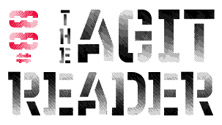
A Dream in Sound
by Kevin J. Elliott
With a record as gorgeous and epic as last year’s Agit favorite, Ashes Grammar, it’s hard not to psychoanalyze its creator in order to find some deeper meaning, some sense of purpose as to why and how it was made. A Sunny Day in Glasgow, a band that claims Philadelphia as its most stable home, started as the bedroom project of Ben Daniels. Once Daniels realized he needed vocals to flesh out the pop songs he envisioned, he quickly recruited his twin sisters, Robin and Lauren, into the fold and began fully realizing the dreamy mix of pop, ambience and shimmering soundscapes swirling around in his head. The band’s 2006 debut, Scribble Mural Comic Journal, certainly sounded like an amorphous blend of those tropes, but may have been too slight, layered beyond cohesion and ultimately not taking hold of the listener despite some breathtaking moments. In comparison, Ashes Grammar is that colorful, textural, fever dream for which Daniels has been searching from the beginning, one that inhabits a space somewhere between the ethereal gauze of the Cocteau Twins, the glowing guitar waves of My Bloody Valentine, and the shape-shifting minimalism of electronic artists like the Field and Fennesz. But even as expansive and seemingly comprehensive as Ashes Grammar sounds, there are plenty of loose ends, patterns that blur in the horizon, and unformed thoughts that suggest Daniels’ journey is far from over.
Daniels’ sisters left the band before Ashes Grammar, but Annie Fredrickson came on board in time for the recording. When it came time to take the record on the road, longtime fan Ryan Newmeyer joined as bassist and Adam Herndon came on to play drums, while Jen Goma was recruited to sing through an open-call for recorded submissions. In fact, in talking with Daniels and guitarist Josh Mekam before a recent show in Columbus about topics as varied as psycho-geography and the profound influence of Led Zeppelin, I found that A Sunny Day in Glasgow is still a constantly evolving band, recording new material and ideas whenever and wherever they bloom and synthesizing all of these wild muses into a transcendental blur of pop.
Given that your albums are filled with a number of ambient pieces, noisy fragments, and decorative interludes, would you consider yourself more of a composer than a songwriter? I guess what I’m asking is do you feel more comfortable experimenting with sounds or sitting around writing a skeleton of a melody first?
Ben Daniels: It’s half and half, maybe more experimenting with sound.
Josh Mekam: At least that’s how it was with this record. It started off with Ben writing songs and being the core, making demos. He had these skeletal ideas and we took them to the studio and fleshed them all out, and that’s where we did all of the experimenting.
I think that even when you have something that resembles a song, like “Close Chorus” or “The White Witch,” you tend to obscure those melodies even more than the blatantly abstract material. Is this a conscious effort when you are recording? Do you think the melodies become more profound when the listener really has to dig for them?
BD: It’s not such a clear thought as that. You go into the studio and try things, and if it works, you follow that path.
JM: As cheesy as it sounds, we were just trying to make a record that we liked. There were songs that we mixed as straightforward pop songs at first, but then we’d throw reverb on the whole track. Maybe it’s because with this one we were trying to appeal to fans of the last album, but at the same time move in a direction of recording pop songs. We were listening to a lot of ambient and electronic music at the time, so it’s hard not to have your influences seep in.
BD: I was thinking about that today, about what we were listening to leading up to that year. I haven’t listened to a Kompakt compilation in a long time.
Ashes Grammar sounds like a fairly ambitious album, in that editing and piecing it together took some time and patience. Was this a project, one whole work, that you had envisioned from the start, knowing everything that it would encompass, or did it take on a sprawl of its own once you began?
BD: There were a lot more songs that we started recording that we stopped two months in because we knew we wouldn’t finish them. The songs on the album that really tend to build into each other, those we wrote together as a group. But for the most part I didn’t have it mapped out other than just standing back and saying, “Jesus Christ, this is a long album!”
JM: We were really just having a lot of fun. The last album Ben did in his bedroom, so this time we had the proper space. We were able to experiment with all sorts of mics and able to start a song, and if we didn’t like it or got bored, we could work on something else.
I’ve read in a lot of interviews that you have a particular disdain for ’90s shoegaze and don’t really appreciate the comparisons. But given the fact that you’re almost always compared to those bands, I was wondering if you could elaborate on what you find frustrating about those comparisons.
BD: Generally, when somebody mentions one of those bands, I try to argue against it. For me, there were a handful of bands that get called “shoegaze” that were incredible. It was something real that they expressed. Then there are a lot of other bands just taking that aesthetic, and it’s those bands I don’t have time for.
JM: It’s definitely an influence, but we owe just as much to something like the Field. As soon as you use a delay pedal and reverb, you’re in that genre.
BD: I love Boards of Canada. To me, that’s something you could call “dream pop.”
Though I’m not the biggest My Bloody Valentine fan, I do consider the tones and textures of Loveless to be a landmark in modern music. So many bands since then have tried to achieve that sound, though few have even come close to replicating. I feel like Ashes Grammar is an album that reaches that level, without succumbing to mimicry, so I’d like to know how much of an influence Loveless is on your work.
BD: I came into Loveless pretty late. It was actually Josh that introduced that to me.
JM: It’s not something I would want to mimic, but I think it’s a record that is trying to make sounds that have not been made, and that’s something I always try to do.
Is there something else—that doesn’t particularly have to be a band or album—which has truly inspired your recordings?
BD: When I was a kid I got super into Led Zeppelin to the point that now I don’t listen to it anymore. I remember driving around with my mom, and “Over the Hills and Far Away” came on the radio. I loved that song so much. My mom suggested I start playing guitar, so that’s where that started.
You’ve travelled and lived in a number of different places over the years, and I do think there’s transience in your music that represents that wanderlust. Do you think being a bit of a nomad has an influence on what you do musically?
BD: On our albums, I like to put cities on there because I’m a strong believer in psycho-geography. It’s the study of places affecting thought. Living in London had a big impact on some of my songwriting.
I know Ashes Grammar was finished quite some time ago, so what have you been doing in the meantime? Can you give a hint at all at what you want the next record to sound like?
BD: We have a lot of songs we need to finish up once we finish touring. Compared to Ashes Grammar, they are a lot happier, a little poppier.
